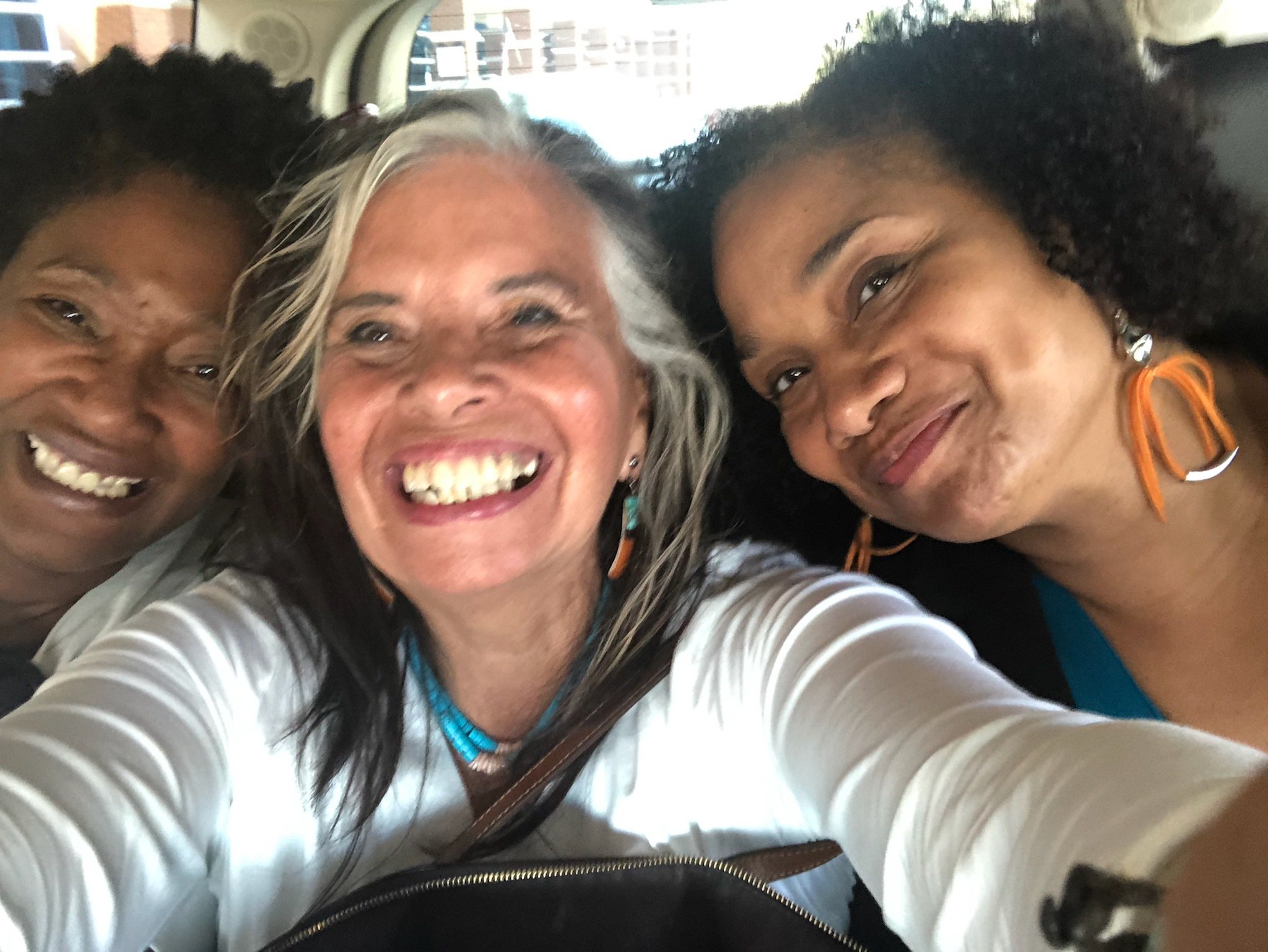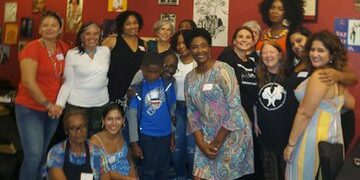CJI Celebrates Andrea James & the National Council of Incarcerated and Formerly Incarcerated Women & Girls
Deborah Peterson Small
 Last week, CJI staff and FreeHer Circle members traveled to Montgomery, Alabama to join more than 500 formerly incarcerated women and girls and other criminal justice activists at the Second Annual Conference of the National Council of Incarcerated and Formerly Incarcerated Women and Girls (National Council).
Last week, CJI staff and FreeHer Circle members traveled to Montgomery, Alabama to join more than 500 formerly incarcerated women and girls and other criminal justice activists at the Second Annual Conference of the National Council of Incarcerated and Formerly Incarcerated Women and Girls (National Council).
The National Council is the outcome of work begun by Andrea James, a formerly incarcerated woman from Boston, Massachusetts who began organizing her fellow women prisoners while serving time in federal prison. They formed Families for Justice as Healing (FJAH), “with the goal to raise public awareness of women as the fastest-growing incarceration population and to use our voices to create a more accurate portrait of who we are, what we had learned and what we could contribute to this dialogue.”
The National Council works to end the incarceration of women and girls and to shift society from a criminal legal system focused on punishment, to a system based on human justice. In many ways, Andrea James has shown herself to be a visionary leader. She describes her perspective this way:
We must turn the discussion upside down and instead of focusing on “re-entry” seriously think about what we need to do for “no-entry.” We must acknowledge the centrality of violence and sexual abuse of women and girls, racism, poverty and homophobia as drivers of the criminalization and incarceration of women and girls. If we do not, we will just be tinkering around the edges. Only when we step back and look at the complex big picture, will we be able to begin to undo some of the immeasurable harm that has been done and invest in resources to help communities begin to heal and thrive.
During the years since her release, Andrea has worked diligently to help build the movement of formerly incarcerated women to end mass criminalization and incarceration and ultimately create a world without prisons. Andrea and the leaders of the National Council have organized formerly incarcerated women throughout the country to work in their local communities to promote policies that will end mass incarceration, particularly of women and girls. Their work is collaborative and expansive employing peer education to share information and experiences, using a movement building framework to guide decision making and resource allocation. Channeling the spirit of Black leaders like Ella Baker and Fannie Lou Hamer, Andrea understands that power is built from the ground up and that organized people are the most effective response to organized money.
Fundamental to her success is her willingness to speak truth to power. Andrea has consistently challenged the failure of our justice system to respond to the special needs of women who are incarcerated and the families they leave behind. She has consistently called out the institutional racism that drives so much of our national crime policies and the impact of that racism on vulnerable women, especially indigenous women, women of color, sex workers, and transgender women. By centering her work on women at the margins of society, she reminds us liberation starts within and emanates outward. The movement that convened in Montgomery is more than a movement to end mass incarceration and mass criminalization, it is a movement for social and economic justice, for the transformation of society. The theme for the conference was aptly identified as : REIMAGINING COMMUNITIES. The conference program was comprised of women and girls from directly impacted communities sharing their stories and speaking into existence the alternative approaches that will better serve themselves and the people they love.
The National Council’s political education program includes holding convenings at locations of political and/or historical significance. Last year’s conference was held in Tulsa, OK – in a state with the highest incarceration rate for women in the country and a city where one of the worse occurrences of state-sponsored violence against a Black community took place. This year’s conference was held in Montgomery, Alabama, the birthplace of the modern civil rights movement, where today buildings that once warehoused enslaved Africans have been repurposed as museums that tell our stories of resistance and resiliency in the face of relentless racial oppression and violence.
It is impossible to understand our contemporary system of criminal punishment and mass incarceration without acknowledging its roots in our history of enslavement, dehumanization and exploitation. It’s no coincidence that a nation founded on enslavement and indigenous genocide would become the world’s foremost incarcerator – Montgomery, Alabama is the perfect place to confront that history and explore ways to overcome it. Part of confronting our history of racial domination, exploitation, and murder is recognizing that “whiteness” breeds a form of denial that makes it difficult for the beneficiaries of this social construct to address it honestly. Whites (and others influenced by whiteness) often see racism as a series of individual acts and explicit attitudes, rather than a system of oppression that includes explicit and implicit biases of those who are a part of it. For many whites, racism is seen as a binary. To be a racist is to be a bad person. To be not racist is to be a good person. This binary causes white people to feel defensive in conversations around race. We all fear being seen as a bad person. And according to the binary, you can’t be a good person and be complicit with racism.
These views working together function to keep white people, even progressive white people, from really dealing with the ways that they uphold systems that are oppressive to people of color, and the ways that they participate in racism. As long as they remain unwittingly or defiantly blind to these beliefs, progressive white allies are people who are not safe to follow because they will not see how their investment in a system that benefits them at the expense of others, twists their understanding of reality. Sometimes the unwillingness to face their participation in a racist system takes the form of lashing out at people of color for reminding them of their collective crimes – Why do we have to keep talking about this? When will Black people get over slavery, it was hundreds of years ago and after all, I voted twice for Barack Obama? How can I be racist, I served time in prison too?
The National Council will not be deflected from its mission by those unwilling to engage in the work of personal transformation, which is an essential component of movement building. CJI has long recognized you cannot accomplish externally, what you fail to accomplish within. Acknowledging how women have been pitted against each other, CJI has intentionally created a collaborative circle that includes black, white, native, Latinx, and trans women, many of whom have experienced incarceration.
Through a Just Sisterhood, a new relationship is formed, a necessary foundation for achieving liberation for all women. It’s because of this steadfast integrity and focus on its mission of empowering women who’ve been harmed by the criminal legal system that the Circle for Justice Innovations is proud to partner with the National Council to create our newest grant making fund – FreeHer. The FreeHer Fund will support grassroots organizing that is based in awareness of the current political environment’s hostility toward the rights of women and girls; is led by women and girls directly impacted by the criminal legal system; and is working to restore or expand the rights of currently and/or formerly incarcerated women and girls. The FreeHer Funding Circle is grounded in values defined by CJI Director, Aleah Bacquie Vaughan as “JUST SISTERHOOD”. These values are: honesty, truth-telling, acknowledgment,power-sharing, and dignity.
The FreeHer Circle is an innovative and diverse grant-making panel comprised of community organizers, most of whom have experienced incarceration, donors and donor-activists. We share power and a passion for supporting meaningful, transformative, and systemic change in the criminal legal system. The present moment in history places our movement at a critical juncture. Activists and commentators alike have introduced a wealth of policy proposals. Some would be effective, others ineffective, still others insidious and harmful. CJI believes that formerly incarcerated movement leaders and their organizations, working at the grassroots and drawing from experience, must be at the forefront of determining the policies that will move us forward. The movement must also push back against the emergence of tools of repression, however disguised. The National Council of Currently and Formerly Incarcerated Women and Girls is an outstanding example of the type and style of work CJI was created to support and we are proud to partner with them in launching the FREEHER Fund.



